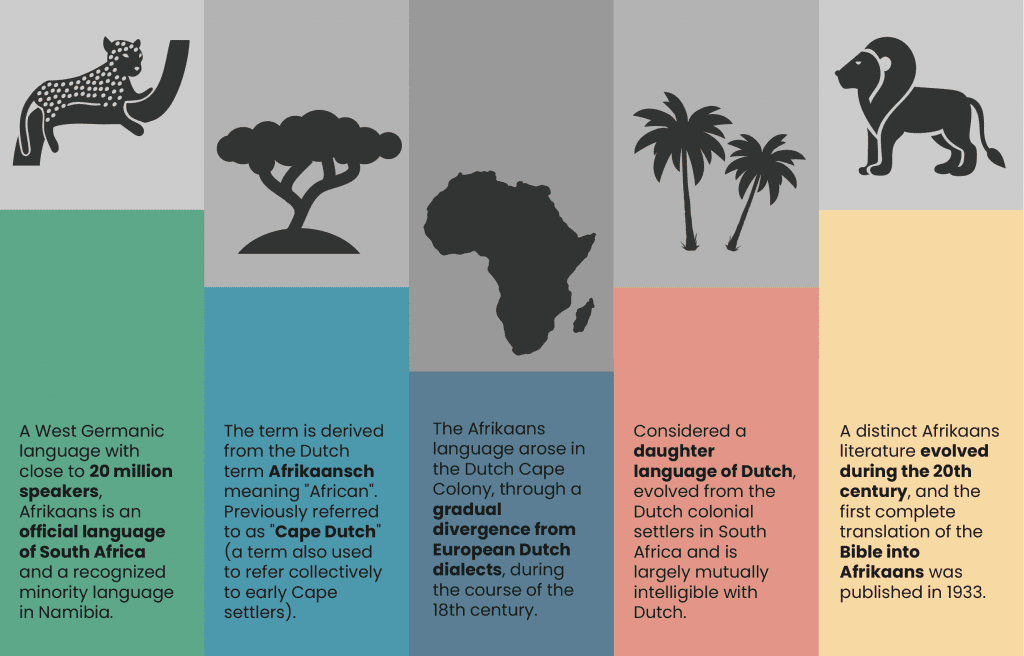The origins of the Afrikaans Langauge
Afrikaans is the ‘daughter language’ of Dutch. It is spoken by about 7.2 million people as a native language, and by about 10 million more as a second language. It is an official language of South Africa as well as a recognized language in Namibia, where some of the population also speak it. In South Africa, it is the third most spoken language, after Zulu and Xhosa.
As a ‘daughter language’ of Dutch, much of its core vocabulary and grammar come from Dutch, with scholars claiming that over 90 percent of vocabulary is shared. It is still mutually intelligible to Dutch to some degree, which is a West Germanic language. Other languages in this family also include German and English. Other vocabulary influences include Malay, as Malay words entered Dutch through its colonial history, which indirectly influenced Afrikaans. Moreover, influence from other languages in the region were important in distinguishing Afrikaans from Dutch. These included Khoisan dialects and Bantu languages, spoken by various groups in the region.
Unique characteristics of Afrikaans include its lack of conjugation, unlike Dutch in English. For example, in English, ‘to be’ changes according to subject, with the combinations of ‘I am’, ‘you are’, and ‘he is’. In Afrikaans, to be is always ‘is’. In general, there are less tenses as well.
The Afrikaans writing system stems from Dutch, which ultimately is Latin-based. There are 26 characters. In addition, there are letters that contain accents. There is also very different punctuation rules, such as the use of apostrophes.
As mentioned before, the Afrikaans language emerged from the Dutch, when South Africa was under Cape Colony rule between 1652 and 1806. While the original Dutch colony was first established with the aim of taking advantage of the geographic location and natural resources, it eventually also became a settler colony, where Dutch groups eventually migrated to. Afrikaans was a natural divergence from Dutch throughout the 18th century. At first, it was called a ‘kitchen language’, as compared to a more prestigious standard Dutch. It was also associated with the Afrikaners, an ethnic group in Southern Africa that are the descendants of the original settlers from Holland. The Afrikaners were the group in power up until 1994.

South Africa had a unique linguistic history in general with a combination of African languages being used, as well as Malay being used in Muslim schools. In the beginning of the 19th century though, Afrikaans started to replace Malay, albeit written with an Arabic script. In the late 19th century, publications were produced by Afrikaans speakers, which included religious materials as well as dictionary and grammars. By 1925, Afrikaans had been recognized as its own language, as opposed to just dialect of Dutch.
Afrikaans has been a linguistic core of the development of the languages that exist in South Africa today, including the development of South African English. South African English contains a number of Afrikaans loan words for everyday concepts. For example, tekkies for sneakers, braai for barbeque, and more.
However due to the racial tensions in South Africa, Afrikaans is a highly politicized language. Afrikaans, as a representative of Afrikaaner culture, and therefore a symbol of European oppression in Africa, is not a language of prestige among the Black community. Thus, many oppose its use, especially in fields of education. Examples of this include a rebellion that occurred in Soweto at a secondary school, when the government decided that Afrikaans should be used to teach half the subjects. Eventually, this decision was withdrawn. Another example occurred in 2015 when there were student protests that resulted in violence. Instead, English is preferred, even though it is the native language of only about 8% of the population.
Despite the political and cultural emotions, and its association as a ‘Caucasian’ language, the majority of Afrikaans speakers are not white, according to some surveys conducted. In addition, Afrikaans is still one of eleven official languages in South Africa. It is a language that remains prevalent in mass media, being the second most used language after English in this regard. Afrikaans remains influential in entertainment, literature, and education as their is a market that caters to Afrikaans speaker, even though it is not treated with as much preference as in the Apartheid era. There is even a monument erected in recognition of its status, called the Afrikaans Language Monument. In Namibia, as a recognized official language along with German, it is still used as a lingua franca, due to sizeable populations of Afrikaans speakers.
VEQTA can provide a perfect Afrikaans translation services, both Afrikaans to English translation and English to Afrikaans translations. Our qualified Afrikaans translators are readily available to assess your requirements and content to be translated to Afrikaans.
If you need translating Afrikaans get in touch with VEQTA today!
A dedicated team of Afrikaans translators who combines Experience, Specialized Subject Matter Expertise with best Translation Practices to deliver quality second to none.


